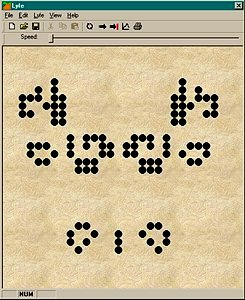If objects in our world exist constantly, by themselves alone, their time should pass absolutely, at a fixed rate regardless of events. In contrast, if objects in our world are virtual, their time will pass as their pixels are generated, so if we pause a game, the screen freezes and time in that game stops, until it is restarted again. In a game world, time passes as game events occur.

For example, Conway’s Game of Life produces pixel patterns that arise, change, and vanish, to simulate how living things arise, change, and die in our world (Figure 2.10). If we pause the game, its time stops, and if we restart it, its time carries on. The lifetime of a pattern is then the number of game events that it exists for. Time in a virtual world is measured by its events just as we measure our time by atomic events.
Now suppose that a pixel pattern repeats for twenty minutes of our time, is that its lifetime? It might seem so, but if the game runs on a faster computer, that pattern might only repeat for a few seconds. To us, it lives less, but the number of computer events is the same. The lifetime of a game entity doesn’t change when it runs on a faster computer, because the events completed are the same. The same pattern run by two computers, one fast and one slow, has the same game life, even though we see different times.
This can explain Einstein’s twin example. Relativity predicts that a twin who travels in a high speed rocket for a year could return to find his brother is an old man of eighty. Neither twin would know that their time ran differently, but one twin’s life could be nearly over while the other’s is still beginning. Yet the eighty-year-old twin wouldn’t be cheated, as he still got eighty years of heart beats, and grandchildren to boot. The twins would only realize that their time had passed differently when they met again, to find themselves at different ages. Relativity predicts that our lifetimes can change just as lifetimes change in Conway’s Life, so our time can change as it does in a game world!
When people first hear that our time changes, they think it is a trick, that only perceived time changes, but it isn’t so, because it is the time measured by clocks that changes. For example, accelerating short-lived particles can double their observed lifetimes. Speed shouldn’t change how time passes in an objective world, so why does it change how time passes in our world?
To understand this, consider a computer game where events occur on the screen one after another. In a big battle, when a lot of events occur quickly, gamers expect the screen to slow down when the computer has a lot to do, because drawing more events on the screen takes longer. The battle event sequence stays the same, but the screen lags when more events occur.
This suggests that time slows down when objects go faster in our world because the quantum network has more to do. Each point of the quantum network has a finite capacity, so it can only generate life events at a certain rate. If movement also uses that capacity, increasing the rate of movement will decrease the rate of life events, giving a trade-off between an entity’s lifetime and its speed. If an object goes faster, its life will run slower to compensate, so its time slows down.
Just as a game slows down when there is more to do, so our lives slow down when we move faster. In Einstein’s example, the rocket twin’s life ran slower because the quantum network had to manage his movement as well, so he only aged a year, but his earth twin had no such load, so eighty years of life passed in the usual way. In our world, going faster makes life go slower, as it dilates time, but does this make time travel possible?